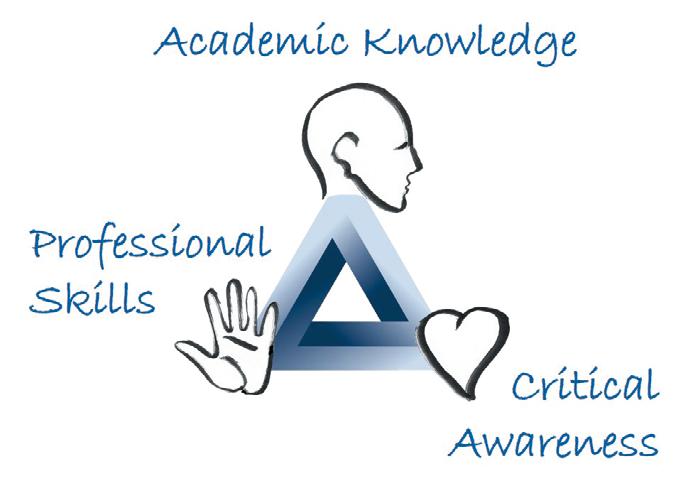
2 minute read
Figure 11: The traditional triad of essential areas of development in holistic education and training programmes
from Transdisciplinary Learning for Sustainable Development: Experience in Course and Curriculum Design
Pragmatic framework to define ESD competences
Our action competence model presented in Figure 13 and Table 1 below takes into account the discussion of competences for ESD, but it is based on and adapted from our own practical experience. On the one hand, we prefer a clear distinction of competence categories. In the 1970s, an important idea still widely accepted today was put forward by the German educational researcher, Heinrich Roth. He argued that in order to shape our world, not only “professional competence” in the sense of factual knowledge is important (handling the subject), but also social competence (handling others) and “personal competence” (handling oneself) (Roth 1971). Many important subsequent competence models refer to this idea (e.g. Weinert 2002, Rychen 2008). On the other hand, our model considers the traditional triad of pillars described below, “academic knowledge, professional skills, and critical awareness” (Figure 11; see Chapter 3.1.1).
Figure 11: The traditional triad of essential areas of development in holistic education and training programmes (Design: K. Herweg)
Academic knowledge for ESD
The three categories of knowledge relevant for ESD are the same as those used in transdisciplinary research (Chapter 1.3; and Figure 12):
• Systems knowledge: Knowledge about complex social, economic, and ecological interrelationships and their interacting effects. In other words: understanding how the system – i.e. the complex interactions between environment, society, and economy – works. • Target knowledge: Knowledge about relevant objectives, including how these objectives are selected over others (i.e. justifying selection, prioritizing objectives). Science can provide direction for steering towards SD. • Transformation knowledge: Knowledge about realistic solutions, options for action, strategies, and measures. Scientific contributions, e.g. in the form of rules, solutions, measures, cultural practices, or technologies to promote SD. Transformation knowledge includes monitoring and reviewing the achievement of goals, using disciplinary and interdisciplinary scientific methods.
Professional skills for ESD
The professional skills needed for ESD are diverse and situation-dependent. They are anchored in the standard educational programme of each discipline. They include the ability to compose target-group oriented texts while remaining factually sound and constructive, processing data using spreadsheets or statistics programmes, and finding ways of presenting data visually. Other basic skills include researching and evaluating relevant information, as well as mastering communication technology or subject-specific methods for data collection. In ESD, these mainly disciplinary professional skills must be supplemented by inter- and transdisciplinary skills, examples of which are listed in Table 1.







